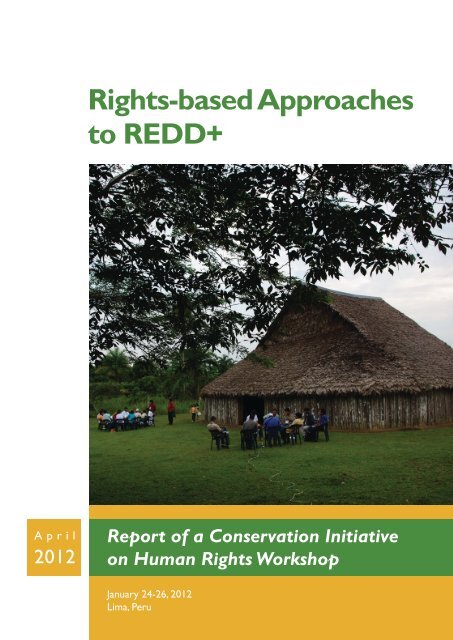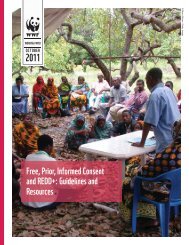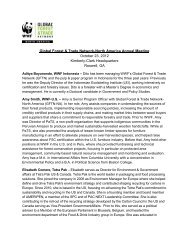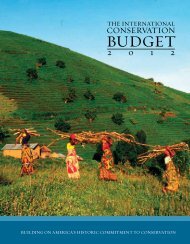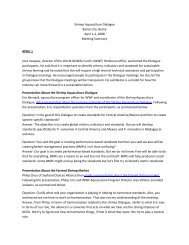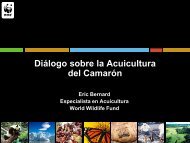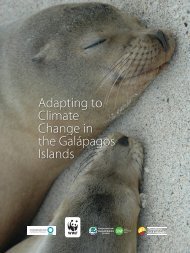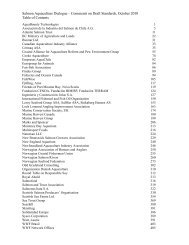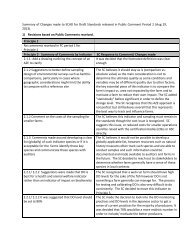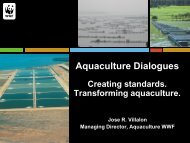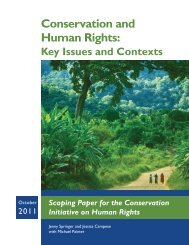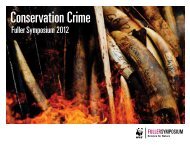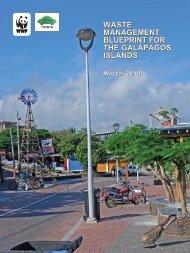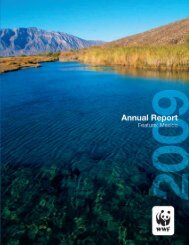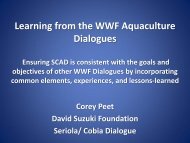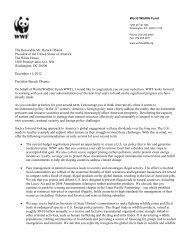Rights-based Approaches to REDD+ - World Wildlife Fund
Rights-based Approaches to REDD+ - World Wildlife Fund
Rights-based Approaches to REDD+ - World Wildlife Fund
Create successful ePaper yourself
Turn your PDF publications into a flip-book with our unique Google optimized e-Paper software.
<strong>Rights</strong>-<strong>based</strong> <strong>Approaches</strong><br />
<strong>to</strong> <strong>REDD+</strong><br />
April<br />
2012<br />
Report of a Conservation Initiative<br />
on Human <strong>Rights</strong> Workshop<br />
January 24-26, 2012<br />
Lima, Peru
Acknowledgement<br />
This report was made possible with the generous financial and in-kind support of member<br />
organizations of the Conservation Initiative on Human <strong>Rights</strong>.<br />
WWF gratefully acknowledges the support of the Government of Norway through a grant administered<br />
by the Norwegian Agency for Development Cooperation (Norad). The views expressed herein are not<br />
intended <strong>to</strong> reflect the policy views of either of these entities or their affiliates.
<strong>Rights</strong>-Based <strong>Approaches</strong> <strong>to</strong> <strong>REDD+</strong><br />
Workshop Report<br />
Conservation Initiative on Human <strong>Rights</strong><br />
24-26 January 2012<br />
(Lima, Peru)<br />
Background<br />
The emergence of Reducing Emissions from Deforestation and Degradation, and conserving, sustainably<br />
managing and enhancing forest carbon s<strong>to</strong>cks (<strong>REDD+</strong>) has generated great interest in the potential for<br />
<strong>REDD+</strong> <strong>to</strong> increase international support for the forest stewardship activities of indigenous peoples and<br />
local communities. Potential benefits associated with <strong>REDD+</strong> initiatives include strengthening of<br />
community land and resource rights, empowerment of community institutions, increased diversification<br />
of forest-<strong>based</strong> income and new livelihoods opportunities. At the same time, <strong>REDD+</strong> has sparked<br />
concern about potential adverse impacts on indigenous and community rights and livelihoods, such as<br />
negative impacts on land and resource rights, increased centralization of forest management,<br />
inequitable benefit-sharing, lack of real participation and lack of FPIC. Concern about these risks has<br />
prompted enactment of safeguards under the UN Framework Convention on Climate Change (UNFCCC)<br />
and development of safeguards by donor initiatives. At the same time, experience is emerging from a<br />
range of practical efforts <strong>to</strong> “operationalize” community safeguards and benefits in the context of<br />
<strong>REDD+</strong> readiness and pilot activities.<br />
In this context, the Conservation Initiative on Human <strong>Rights</strong> (CIHR) organized a workshop on <strong>Rights</strong><strong>based</strong><br />
<strong>Approaches</strong> <strong>to</strong> <strong>REDD+</strong> from January 24-26 in Lima, Peru. CIHR (www.conservation-rights.org) is a<br />
consortium of international conservation organizations - BirdLife International, Conservation<br />
International, Fauna & Flora International, IUCN, The Nature Conservancy, Wetlands International,<br />
<strong>Wildlife</strong> Conservation Society and WWF - that seek <strong>to</strong> improve the practice of conservation by promoting<br />
integration of human rights in conservation policy and practice.<br />
The workshop brought <strong>to</strong>gether representatives from conservation NGOs, indigenous peoples'<br />
organizations, social development institutions and donor organizations <strong>to</strong> build common understandings<br />
of key rights and governance issues in <strong>REDD+</strong>, <strong>to</strong> learn about emerging best practices and challenges,<br />
and <strong>to</strong> generate recommendations <strong>to</strong> strengthen future work. The workshop focused in particular on<br />
emerging experience from the work of NGOs and civil society organizations <strong>to</strong> promote and support<br />
<strong>REDD+</strong> activities consonant with internationally-recognized human rights. Participants shared<br />
experiences on practical efforts <strong>to</strong> date <strong>to</strong> integrate community safeguards and benefits in <strong>REDD+</strong><br />
readiness and pilot activities, and identified opportunities for collective efforts <strong>to</strong> promote rights-<strong>based</strong><br />
approaches <strong>to</strong> <strong>REDD+</strong> at Peru, Latin America regional and international levels.<br />
1
Introduc<strong>to</strong>ry Session<br />
The introduc<strong>to</strong>ry session included presentations on the CIHR, opening remarks, review of the workshop<br />
objectives and agenda, and a gathering of workshop expectations.<br />
Jenny Springer (WWF) provided an introduction <strong>to</strong> the CIHR, highlighting objectives of the Initiative <strong>to</strong><br />
develop and maintain a common set of human rights principles as they relate <strong>to</strong> conservation, support<br />
members <strong>to</strong> put in place management practices for implementing these principles, and promoting<br />
shared learning on rights-<strong>based</strong> approaches <strong>to</strong> conservation among member organizations, stakeholders<br />
and experts. Climate mitigation, especially <strong>REDD+</strong>, is one of the conservation contexts in which human<br />
and indigenous rights are currently most prominent, and is therefore one focus of CIHR efforts <strong>to</strong><br />
promote learning and best practices and <strong>to</strong> consolidate its member organizations’ joint contributions.<br />
Opening remarks were presented by WWF-Peru and Conservation International-Peru offices’ program<br />
direc<strong>to</strong>rs, Daniel Arancibia and Luis Espinel. The relevance of rights-<strong>based</strong> approaches for both<br />
organizations was highlighted, along with examples of their national and regional initiatives addressing<br />
rights issues in conservation.<br />
Kristen Walker Painemilla (CI) and Consuelo Espinosa (IUCN) presented the agenda and reviewed the<br />
workshop’s objectives <strong>to</strong>:<br />
1. Build common understanding, drawing on multiple perspectives, on key rights and governance<br />
issues relevant <strong>to</strong> <strong>REDD+</strong><br />
2. Share, learn about and document emerging best practices and challenges from NGO/CSO<br />
experience on how <strong>to</strong> address key rights issues in the context of <strong>REDD+</strong><br />
3. Generate lessons and recommendations <strong>to</strong> strengthen ongoing NGO/CSO activities and inform<br />
broader policy and donor processes<br />
4. Identify opportunities for collective efforts <strong>to</strong> promote rights-<strong>based</strong> approaches <strong>to</strong> <strong>REDD+</strong><br />
Participants’ expectations ranged from broad interests <strong>to</strong> learn more about the themes tackled by the<br />
workshop, <strong>to</strong> more specific aims of gaining knowledge on lessons learned from local experiences, better<br />
addressing challenges of working with a human rights-<strong>based</strong> approach, consolidating conservation and<br />
human rights networks, and achieving a better understanding of indigenous peoples’ human rights law.<br />
Context of social safeguards and benefits<br />
This session provided information on the main safeguards systems for <strong>REDD+</strong> developed through the UN<br />
Framework Convention on Climate Change (UNFCCC), donor initiatives and other international<br />
processes. The following presentations were given and are available on the CIHR website.<br />
Social and Environmental Safeguards in UNFCCC – Johnson Cerda, CI Indigenous and Traditional Peoples Program<br />
<strong>REDD+</strong> SES Voluntary Principles – Montserrat Alban, CI & Elvira Raffo, CARE<br />
Integration of rights-<strong>based</strong> approaches in UN-REDD and the Common Approach on Environmental and Social<br />
Safeguards for Multiple Delivery Partners - James Leslie, 2 UNDP
Presentations and discussions highlighted a number of key developments and issues. Under the<br />
UNFCCC, the December 2010 COP-16 meeting produced the Cancun Agreement, including a set of social<br />
and environmental safeguards for climate mitigation and sustainable forest management activities.<br />
While recognized as an important step, many indigenous peoples’ organizations have also stressed that<br />
there is space for improvement <strong>to</strong> adequately address their concerns and interests in a final legal<br />
framework. Indigenous peoples ask for the recognition of key rights: right <strong>to</strong> lands, terri<strong>to</strong>ries and<br />
resources; recognition of traditional knowledge and traditional practices; and respect <strong>to</strong> indigenous<br />
peoples’ own governance structure and equitable benefit sharing. It was noted that the Cancun<br />
Agreement only takes in<strong>to</strong> account the UN Declaration on the <strong>Rights</strong> of Indigenous Peoples, though this<br />
is considered a crucial and comprehensive instrument by indigenous peoples.<br />
At the UNFCCC Durban Conference (COP-17) Member States agreed <strong>to</strong> establish a Social and<br />
Environmental Safeguards information system; however, no agreement was reached regarding the<br />
specific content and criteria of the reporting system. Indigenous organizations sought a rights-<strong>based</strong><br />
moni<strong>to</strong>ring system but such a standard was not reached.<br />
Among donor initiatives, the UN-REDD Programme has developed a set of Social and Environmental<br />
Principle and Criteria (still in draft version), <strong>to</strong> guide the design of UN-REDD national programs. A Benefit<br />
and Risk Tool has also been developed <strong>to</strong> support countries’ implementation of the UN-REDD SES<br />
Principles and Criteria. To promote a common approach <strong>to</strong> safeguards between UN-REDD and the Forest<br />
Carbon Partnership Facility, the two initiatives have jointly developed Guidelines on Stakeholder<br />
Engagement – with a focus on indigenous peoples and other forest-dependent communities. UN-<strong>REDD+</strong><br />
has also developed Guidelines on Free, Prior and Informed Consent (FPIC), expected <strong>to</strong> be finalized and<br />
approved by the UN-REDD Policy Board in March 2012.<br />
The <strong>REDD+</strong> Social and Environmental Standards (<strong>REDD+</strong> SES), are a set of voluntary principles, criteria<br />
and indica<strong>to</strong>rs for government-led <strong>REDD+</strong> (national and sub-national) initiatives, designed <strong>to</strong> promote<br />
both safeguards and high levels of social and environmental performance. Developed through a multistakeholder<br />
process, the <strong>REDD+</strong> SES are being piloted by several national and state governments.<br />
While valuable, participants raised questions about the complexity and potential for inconsistency<br />
presented by these multiple safeguards systems, and feasibility of greater standardization. Also, one<br />
lesson from <strong>REDD+</strong> SES implementation has been that large numbers of indica<strong>to</strong>rs with multiple<br />
qualifiers (adjectives) has made it difficult <strong>to</strong> translate indica<strong>to</strong>rs in<strong>to</strong> national contexts and collect<br />
information in the field. The indica<strong>to</strong>rs are being revised <strong>to</strong> address this.<br />
COICA representatives highlighted the alternative approach presented by Indigenous REDD – a set of<br />
principles and policies developed by COICA in 2010, then further developed and presented in Durban.<br />
(See Land and Resource <strong>Rights</strong> section below for more on Indigenous REDD.) Participants also noted that<br />
it is important <strong>to</strong> avoid “reinventing the wheel” with <strong>REDD+</strong>, as it is simply a new name and line of<br />
financing for forest conservation and sustainable local development. As such, <strong>REDD+</strong> will not be the<br />
solution, but can be added as one element <strong>to</strong> this more integrated vision.<br />
3
Thematic sessions<br />
Thematic sessions addressed the four main workshop themes of participation in <strong>REDD+</strong> national and<br />
sub-national programs; free, prior and informed consent; land and resource tenure; and equitable<br />
sharing of benefits), with panels presenting on each of the four themes. The following presentations are<br />
available on the CIHR website.<br />
Participation in <strong>REDD+</strong> national/sub-national programs<br />
Participation and <strong>REDD+</strong>: Importance, challenges and main lessons learned – Consuelo Espinosa, IUCN<br />
Comparative experiences – case studies<br />
o Participation of Indigenous Peoples in <strong>REDD+</strong> Processes in Guatemala - Mario Escobedo,<br />
IUCN<br />
o Promoting participation in <strong>REDD+</strong> in Colombia – Camilo Ortega, WWF-Colombia<br />
o Capacity-building and stakeholders’ engagement in <strong>REDD+</strong>, Luis Barquín, CI<br />
Free, Prior, Informed Consent<br />
The importance of FPIC in the context of Readiness and major challenges -<br />
Johnson Cerda, CI - Indigenous and Traditional Peoples Program<br />
Comparative experiences – case studies<br />
o The right of consultation, challenges and progress in Peru and its implications in the <strong>REDD+</strong><br />
context- Ivan Langera, Deputy Minister, Ministry of Culture, Peru<br />
o<br />
o<br />
The participation of Civil Society in the context of <strong>REDD+</strong> - Milagros Sandoval, CI-Peru<br />
Local challenges and the concept of FPIC for local communities in Suriname - Annette<br />
Tjonsiefat, CI-Suriname<br />
Land Tenure, Resource <strong>Rights</strong> and <strong>REDD+</strong><br />
Tenure issues in <strong>REDD+</strong>: Challenges and relevant experience – Jenny Springer, WWF<br />
Comparative experience – case studies<br />
o Indigenous Terri<strong>to</strong>rial Management and Avoided Deforestation in the Greater Madidi-Tambopata<br />
Landscape – Robert Wallace, <strong>Wildlife</strong> Conservation Society - Bolivia<br />
o Indigenous REDD is Vida Plena terri<strong>to</strong>ries - Henderson Rengifo & Rober<strong>to</strong> Espinoza, AIDESEP (with<br />
Forest Peoples’ Programme)<br />
o Lessons from a forest carbon + coffee initiative and R-PP for Chiapas, Mexico, Mónica Morales, CI-<br />
Mexico<br />
Equitable Sharing of Benefits<br />
Review of benefit-sharing programs - Jill Blockhus, The Nature Conservancy<br />
Comparative experiences – case studies<br />
o<br />
o<br />
Experiences from Brazil PES schemes - Andre Silva Dias, WWF Brazil<br />
Ecuador: Experiences from Socio Bosque on benefit sharing - Montserrat Alban, Conservation<br />
International<br />
4
Key discussion areas - themes<br />
The following main points are distilled from thematic session presentations and discussions, and from<br />
theme-specific break-out groups.<br />
Participation in <strong>REDD+</strong> decision-making<br />
Concerns <strong>to</strong> ensure full and effective participation in <strong>REDD+</strong> are <strong>based</strong> both on international rights<br />
frameworks (such as Rio Principle 10, and the Aarhus Convention) and on recognition that participation<br />
contributes <strong>to</strong> the practical effectiveness of <strong>REDD+</strong>. The emphasis on participation in UNFCCC<br />
safeguards and donor standards provides a foundation for engagement of indigenous peoples and local<br />
communities in <strong>REDD+</strong>. However, participants expressed concern that <strong>REDD+</strong> processes have generally<br />
not been very effective in involving stakeholders – particularly from vulnerable groups. The absence of a<br />
government role has sometimes been filled by other stakeholders, with mixed results.<br />
4 key elements for effective community participation in <strong>REDD+</strong> decision-making include:<br />
Capacity and awareness - training is a starting point for a good process; communities need <strong>to</strong>ols<br />
<strong>to</strong> understand, engage in discussions and make decisions about <strong>REDD+</strong><br />
Definition of the community’s own agenda on <strong>REDD+</strong> - interest from communities themselves,<br />
<strong>based</strong> on connections <strong>to</strong> their own priorities, is the basis for active participation (e.g., see box<br />
below for an example from SocioBosque of links <strong>to</strong> Life Plans)<br />
Strong local organizational and governance structures, including <strong>to</strong> articulate and negotiate<br />
agendas<br />
Links from local <strong>to</strong> national levels (communities <strong>to</strong> representative organizations)<br />
Practical approaches <strong>to</strong> promote informed participation of indigenous peoples and local communities in<br />
<strong>REDD+</strong> decision-making include capacity-building workshops for indigenous communities and<br />
organizations (as in Colombia) and establishment of roundtables – either specifically for indigenous<br />
communities and/or <strong>to</strong> enable communities <strong>to</strong> voice their interests in relation <strong>to</strong> other stakeholders (as<br />
in Peru). CI has also developed <strong>to</strong>ols for Stakeholder Engagement in <strong>REDD+</strong> analysis, planning and<br />
moni<strong>to</strong>ring.<br />
While some participants identified the need <strong>to</strong> communicate <strong>REDD+</strong> issues in simple terms <strong>to</strong> local<br />
communities as a challenge, others <strong>to</strong>ok issue with this, noting that indigenous communities have used<br />
their own knowledge and resources for many years <strong>to</strong> accomplish avoided deforestation. The problem,<br />
they noted, is that we are going in with our own concepts and language, whereas we need <strong>to</strong> start with<br />
and complement their vision.<br />
Other challenges identified by the group include that participation can require that indigenous and local<br />
communities invest significant time in “process” with few concrete benefits, at least in the short-term.<br />
Meanwhile, communities are looking <strong>to</strong> realize some benefits from the forests – this is one of the<br />
fac<strong>to</strong>rs behind the signing of (unfair) contracts with “carbon cowboys.” Costs of participation processes<br />
themselves, especially for ongoing participation in <strong>REDD+</strong> decision-making and moni<strong>to</strong>ring, are another<br />
challenge, along with the fact that participation does not guarantee that views are taken in<strong>to</strong> account.<br />
5
Participants felt that expectations of benefits stemming from <strong>REDD+</strong> also need <strong>to</strong> be tempered;<br />
participation processes should communicate clearly about reasonable expectations of benefits.<br />
Participation in the SocioBosque Program <strong>based</strong> on a Plan de Vida (Life Plan) - Ecuador Environment Ministry & Shuar<br />
Federation<br />
Emerging good practice<br />
The community considered the SocioBosque Program as an opportunity <strong>to</strong> implement their Life Plan and, on the<br />
other hand, the SocioBosque Program identified the community’s Life Plan as the basis for its work with the<br />
community. This reliance on a Life Plan already developed by the community is an emerging good practice –<br />
however, taking this up systematically within the SocioBosque Program remains a challenge.<br />
Lessons learned<br />
Along with the Life Plan it is important <strong>to</strong> define investment priorities –and <strong>to</strong> moni<strong>to</strong>r the implementation of<br />
such investment plan.<br />
Free, Prior, Informed Consent<br />
Workshop participants identified a number of issues related <strong>to</strong> the implementation of FPIC in relation <strong>to</strong><br />
<strong>REDD+</strong>, including:<br />
Challenges associated with different definitions and understanding of FPIC (consultation vs.<br />
consent)<br />
Primary role and obligation of governments <strong>to</strong> obtain FPIC<br />
Lack of clarity in responsibilities of third-party ac<strong>to</strong>rs <strong>to</strong>wards indigenous communities<br />
Issues of representation in indigenous communities, and extent of broad community<br />
participation in traditional decision-making processes<br />
Conflicts within or between indigenous communities<br />
Challenges of juggling community timelines with donor demands<br />
Time required for FPIC processes can appear long even <strong>to</strong> community members themselves.<br />
Questions of who has rights <strong>to</strong> FPIC – while primarily identified as a right of indigenous peoples,<br />
discussions of FPIC also refer increasingly <strong>to</strong> “local communities.” However, the concept of local<br />
communities is very wide, and even in indigenous lands others are now moving in.<br />
Questions of how <strong>to</strong> move forward with <strong>REDD+</strong> in the absence of national legislation regarding<br />
FPIC.<br />
Several emerging good practices for an FPIC cycle in <strong>REDD+</strong> initiatives were identified, such as:<br />
Begin consultation from the outset of any plans (“It is a mistake <strong>to</strong> say ‘we won’t discuss with<br />
communities from the outset, because we don’t want <strong>to</strong> raise expectations.’”)<br />
Respecting communities’ pro<strong>to</strong>cols and structures, and identifying or developing an FPIC<br />
pro<strong>to</strong>col jointly with the community<br />
Establishing proactive, culturally pertinent and continuous communication<br />
Working with flexible timelines, following community timeframes<br />
Supporting the enabling environment for FPIC implementation, including capacity-building for<br />
government on FPIC processes and responsibilities<br />
6
Identifying community trainers and traditional authorities who can develop the FPIC cycle –the<br />
external and/or third parties should only support the process but not assume leadership<br />
Clarifying the roles/responsibilities of all stakeholders<br />
Participants also noted that there is an opportunity <strong>to</strong> consolidate the experience that many<br />
communities and organizations already have with FPIC.<br />
Highlights of the presentation ‘The right of consultation, challenges and progress in Peru and its<br />
implications in the <strong>REDD+</strong> context’ - Ivan Lanegra, Vice-Minister of Interculturality of Peru<br />
Consultation and consent are different; however they are frequently used indistinctly in Latin American<br />
countries and law courses. This confusion has generated controversy. It is therefore important <strong>to</strong> clarify the<br />
different responsibilities of the State on consultation-related issues.<br />
The term consent should be used when there are rights the State cannot affect by any means, such as<br />
formal or cus<strong>to</strong>mary indigenous peoples’ rights <strong>to</strong> lands. If an indigenous community does not want <strong>to</strong><br />
reach an agreement with a private party regarding their lands, the State cannot interfere. There are<br />
nonetheless exceptions for situations like this in the Peruvian legislation.<br />
Peru passed the Consultation with Indigenous Peoples Law, <strong>based</strong> in ILO Convention 169 concerning<br />
Indigenous and Tribal Peoples in Independent Countries. The Consultation Law addresses situations where<br />
the State issues laws that can affect indigenous peoples’ collective rights. However, for its implementation<br />
the State has <strong>to</strong> also consider previously recognized individual and collective rights.<br />
Moreover, ILO Convention 169 applies only <strong>to</strong> indigenous peoples. Therefore, the Consultation with<br />
Indigenous Peoples Law and its Regulation –currently under development, will also only apply <strong>to</strong> indigenous<br />
peoples.<br />
Due <strong>to</strong> the prevailing asymmetry between indigenous peoples and private parties, in some cases the State<br />
has the duty <strong>to</strong> support indigenous peoples <strong>to</strong> ensure a certain level of equilibrium in negotiations is<br />
reached. This would be the case in transfer of a rights agreement <strong>to</strong> indigenous lands. In Peru indigenous<br />
peoples can sell their lands provided that a strong majority of the community agrees.<br />
However, this would not be the case in <strong>REDD+</strong> since forests belong <strong>to</strong> the State and the State grants an<br />
administration right <strong>to</strong> exploit them –a concession. At present a forest carbon market is not possible since<br />
such rights belong <strong>to</strong> the State. A specific regulation should be therefore issued regarding forest-derived<br />
rights if a change in this situation is intended. The decision <strong>to</strong> issue such a regulation could be subject of a<br />
consultation. Nonetheless, until now there is nothing formally decided. The Ministries of Agriculture and<br />
the Environment also hold important responsibilities on this regard.<br />
7
Land Tenure, Resource <strong>Rights</strong> and <strong>REDD+</strong><br />
Participants noted that most forest tenure issues relevant <strong>to</strong> <strong>REDD+</strong> are not new, but rather are<br />
longstanding issues common <strong>to</strong> other forest conservation and sustainable use initiatives. From a tenure<br />
perspective, <strong>REDD+</strong> does introduce some new elements – such as rights <strong>to</strong> the carbon values of forests –<br />
as well as specific challenges and opportunities. Challenges include the problem of “carbon cowboys” –<br />
private specula<strong>to</strong>rs interested in profiting from potential carbon markets, who negotiate unfair<br />
contracts with local communities. At the same time, opportunities include that <strong>REDD+</strong> is drawing<br />
greater attention – and potentially resources – <strong>to</strong> resolving long-standing tenure issues/conflicts, which<br />
are possible <strong>to</strong> resolve. For example, it was noted that the WB is now working on tenure in Peru, as a<br />
result of consultations on Forest Carbon Partnership Facility investments.<br />
Indigenous participants stressed that, currently, the lack of formal recognition of settlement of land<br />
claims makes REDD “dangerous” <strong>to</strong> indigenous peoples. For example, where lands claimed by<br />
indigenous communities are not yet titled, they could be allocated <strong>to</strong> private concessions <strong>to</strong> work on<br />
<strong>REDD+</strong>. Lack of land rights also limits potential for communities <strong>to</strong> participate in <strong>REDD+</strong> initiatives, and<br />
thus limits the effectiveness of <strong>REDD+</strong>. Still, they noted, that there is potential <strong>to</strong> transform <strong>REDD+</strong> in<strong>to</strong><br />
an opportunity. Conditions for “Indigenous <strong>REDD+</strong>” - as articulated by COICA for the Amazon basin –<br />
include terri<strong>to</strong>rial security (fundamental <strong>to</strong> indigenous life), consultation and consent (including<br />
flexibility <strong>to</strong> adjust carbon contracts entered in<strong>to</strong> without full prior information), self-governance, a<br />
holistic approach <strong>to</strong> forest values (not only carbon), respect for cus<strong>to</strong>mary knowledge, no selling of<br />
carbon contracts, and participa<strong>to</strong>ry moni<strong>to</strong>ring of forests.<br />
Presentations and discussions highlighted that national legal frameworks for recognition of indigenous<br />
and community lands can take stronger or weaker forms, with implications for the full realization of<br />
rights and effective forest stewardship. Titling processes may also weaken traditional systems. At the<br />
same time, indigenous participants stressed that it is preferable <strong>to</strong> hold the land title even where there<br />
are risks of not being able <strong>to</strong> fully exercise their land-property rights.<br />
Titling is just a first step <strong>to</strong>wards effective realization of property and the benefits that can be generated<br />
from it. Capacity also needs <strong>to</strong> be in place for management and protection – both at the local<br />
community level and among government agencies responsible for helping communities defend their<br />
rights. It was noted that, in addition <strong>to</strong> technical capacities, realization of tenure rights requires political<br />
will and sharing of power from governments who have his<strong>to</strong>rically claimed ownership and management<br />
authority over forests.<br />
Finally, participants emphasized the importance of taking a holistic approach <strong>to</strong> management of lands,<br />
rather than looking narrowly at carbon values. Indigenous participants in particular stressed that it is not<br />
possible <strong>to</strong> compartmentalize indigenous terri<strong>to</strong>rial management – this integrated approach <strong>to</strong><br />
ecosystems is also a key element of Indigenous <strong>REDD+</strong>.<br />
8
Equitable sharing of benefits<br />
Several challenges were identified regarding <strong>REDD+</strong>-related equitable sharing of benefits:<br />
There are still not –or very few-examples of benefit-sharing in <strong>REDD+</strong><br />
Legal frameworks facilitating effective benefit sharing are seldom in place<br />
How <strong>to</strong> ensure resources actually reach beneficiaries and are not be kept by bureaucracy –<br />
there is frequently no transparency in funds distribution<br />
There is not a lot of dialogue between communities and external stakeholders (governments<br />
and private sec<strong>to</strong>r -corporations) on benefit-sharing issues<br />
Internal communication and decision-making within communities can be a challenge<br />
Land tenure is frequently not clear and this uncertainty stands in the way of equitable<br />
benefit-sharing<br />
The presentations, discussions and the report out from the breakout group brought out the following<br />
conclusions and recommendations:<br />
Benefit sharing framework must be responsive <strong>to</strong> the prevailing context: stakeholders’<br />
needs, deforestation dynamics and institutional capacities<br />
Benefit sharing legal framework must ensure benefits reach the beneficiaries<br />
Benefit-sharing schemes can be developed in a parallel way <strong>to</strong> <strong>REDD+</strong> mechanisms<br />
There must be a moni<strong>to</strong>ring organ and beneficiaries must participate in it<br />
Non-monetary benefits must be visible<br />
Strengthening community organizational structure is crucial for benefits <strong>to</strong> be effective –<br />
good governance is needed <strong>to</strong> address issues such as elite capture<br />
Geographical Group Reports<br />
On Day 3 of the workshop, participants worked in geographical groups (Peru, Latin America regional and<br />
Global) <strong>to</strong> discuss the following questions:<br />
1. How will you incorporate what you have learned in the workshop in your daily work?<br />
2. How can we work <strong>to</strong>gether <strong>to</strong> promote rights-<strong>based</strong> approaches <strong>to</strong> <strong>REDD+</strong>? What form will the<br />
work take? What is the timeline? Do we need financial resources?<br />
The Peru Group proposed <strong>to</strong> develop a pilot Indigenous <strong>REDD+</strong> project, supported by a group of<br />
organizations, which could serve as a replicable model for other communities and help establish an<br />
enabling policy environment. Criteria for selecting an appropriate site include: 1) community interests<br />
and representation, 2) secure tenure, 3) regional political will, 4) resources, 5) potential for alternatives<br />
<strong>to</strong> compete with other forest land uses. As a next step – within 3-6 months – interested organizations<br />
should organize a meeting <strong>to</strong> use these criteria <strong>to</strong> select a place.<br />
9
The Latin American Group proposed three lines of action:<br />
1. Regional <strong>REDD+</strong> policy: Prepare a regional dialogue for high-level policy-makers on sharing<br />
experiences on rights-<strong>based</strong> approaches <strong>to</strong> <strong>REDD+</strong> (land tenure, FPIC, benefit-sharing,<br />
participation, etc.)<br />
o Regional summits were identified as relevant scenarios for the dialogue<br />
o Alliances with governments and regional organizations would be pursued in order <strong>to</strong><br />
support preparation of such a dialogue<br />
2. Identify where <strong>REDD+</strong> and PES schemes have been applied and the resulting lessons learned in<br />
order <strong>to</strong> jointly develop a <strong>to</strong>olkit <strong>to</strong> inform decision-making –linked <strong>to</strong> SES information systems<br />
o WWF is working on a proposal <strong>to</strong> conduct this analysis and develop <strong>to</strong>ols <strong>to</strong> inform<br />
decision-making, which could help generate funds for this activity<br />
3. Making and sharing assessments of ecosystem service and conservation contributions of<br />
indigenous lands, incorporating both traditional and scientific knowledge<br />
o Share the results; two synergies/opportunities might be<br />
• Bio-cultural pro<strong>to</strong>cols currently being developed by CBD Secretariat<br />
• ‘Indigenous terri<strong>to</strong>ries for conservation’ paradigm <strong>to</strong> be presented at the IUCN<br />
<strong>World</strong> Conservation Congress<br />
o <strong>Fund</strong>s are required <strong>to</strong> develop this initiative<br />
The Global Group also identified three lines of action:<br />
1. Policy and Donor Engagement – at international levels and by linking international and national<br />
processes. At the international level, opportunities include:<br />
Workshop on Community Engagement and Benefit Sharing - currently being organized<br />
by TNC in conjunction with the <strong>World</strong> Bank FCPF. The workshop would emphasize links<br />
from practice <strong>to</strong> policy. Some resources are in hand with TNC. (Timing: Late 2012)<br />
UNFCCC – highlighting <strong>Rights</strong>-<strong>based</strong> <strong>Approaches</strong> <strong>to</strong> <strong>REDD+</strong> (workshop outcomes)<br />
through a side event and/or policy piece. (Timing: May, September and/or December)<br />
UN Convention on Biodiversity – highlighting <strong>Rights</strong>-<strong>based</strong> <strong>Approaches</strong> <strong>to</strong> <strong>REDD+</strong><br />
(workshop outcomes) through a side event and/or policy piece. (Timing: Oc<strong>to</strong>ber 2012)<br />
The group also discussed opportunities <strong>to</strong> facilitate better two-way links between international<br />
discussions of social/rights issues (especially by donor initiatives), and national processes <strong>to</strong><br />
develop and implement <strong>REDD+</strong> programs consonant with internationally-recognized rights.<br />
2. Documentation and Communication: several opportunities were identified <strong>to</strong> document and<br />
communicate key issues and outcomes beyond the workshop participants, including:<br />
Producing a workshop report, posting on CIHR website with links (Timing: March)<br />
Producing an RBA <strong>to</strong> <strong>REDD+</strong> Publication with case studies (Timeline: Target is JeJu <strong>World</strong><br />
Conservation Congress)<br />
Conducting a Brownbag series by theme in Washing<strong>to</strong>n, DC, hosted by CIHR members<br />
and with additional virtual participation (Timing: Spring 2012)<br />
10
Producing a CIHR Newsletter: April<br />
3. Training: in light of the high priority placed on informed participation, and several concurrent<br />
training initiatives including development of materials, the group proposed <strong>to</strong> discuss with<br />
indigenous organizations the possibility of developing joint materials on RBAs <strong>to</strong> <strong>REDD+</strong>. An<br />
initial meeting could be held at the UNPFII May 2012.<br />
Conclusions<br />
To conclude participants reflected on how <strong>to</strong> strengthen their work on rights-<strong>based</strong> approaches <strong>to</strong><br />
<strong>REDD+</strong> and follow-up on the main proposals and recommendations discussed during the workshop.<br />
Several recommendations focused on ways <strong>to</strong> share experience and learning more broadly, including:<br />
• Compiling and sharing relevant case studies on rights-<strong>based</strong> approaches <strong>to</strong> <strong>REDD+</strong><br />
• Building networks with NGOs working on human rights<br />
• Strengthening networks <strong>to</strong> enable exchanges and learning across and at all levels<br />
• Facilitating direct exchanges between communities<br />
• Using the Internet (CIHR website) <strong>to</strong> share experience from the region<br />
• Systematizing information – there is so much material that people get lost<br />
• Ensuring that information-sharing is two-way (not only communicating <strong>to</strong> people but<br />
understanding what they know)<br />
• Participating in discussion spaces already hosted by governments<br />
• Reaching out through the CIHR consortium <strong>to</strong> governments and national <strong>REDD+</strong> readiness<br />
processes<br />
• Supporting country and regional offices’ engagement on social issues<br />
Looking ahead, some participants recommended broadening the participation of future workshops <strong>to</strong><br />
include other stakeholders, including those who may not support rights-<strong>based</strong> approaches. Other takeaway<br />
points highlighted by participants were <strong>to</strong>:<br />
• Facilitate joint work with communities and governments on sensitive issues such as benefitsharing<br />
and FPIC<br />
• Address more systematically how <strong>to</strong> work with local communities who live near indigenous<br />
peoples and how we will incorporate them in our dialogue<br />
• Support COICA’s Indigenous <strong>REDD+</strong> paradigm<br />
• Address indigenous communities’ concerns with legal certainty regarding land titles<br />
• Develop capacity-building activities in communities in order <strong>to</strong> better understand their daily<br />
experience and vision of the world<br />
Participants commended the workshop for focusing attention on human rights dimensions that have<br />
received <strong>to</strong>o little focus in <strong>REDD+</strong> discussions <strong>to</strong> date, including among government agencies leading<br />
national processes. They expressed appreciation for the opportunity <strong>to</strong> learn from the presentations of<br />
experience and discussions, and interest <strong>to</strong> continue working <strong>to</strong>gether on rights-<strong>based</strong> approaches <strong>to</strong><br />
<strong>REDD+</strong>.<br />
11
Several noteworthy insights were consistently expressed throughout the workshop discussions,<br />
including:<br />
The concept of development itself might have different connotations for indigenous<br />
peoples. Therefore, the incorporation of indigenous peoples’ views of the world, cultural<br />
identity and relationships with nature and Life Plans (Planes de Vida) emerged as an<br />
essential requirement in a <strong>REDD+</strong> context.<br />
The development of standards addressing social and environmental safeguards (SES) is an<br />
important development. However, there is a need <strong>to</strong> standardize safeguards in order <strong>to</strong><br />
enhance their operational capacity.<br />
A set of indigenous peoples’ concerns was recurrently dealt with:<br />
o Respect for au<strong>to</strong>nomy and indigenous peoples’ rights<br />
o Recognition of traditional practices<br />
o Respect for lands and terri<strong>to</strong>ries<br />
For third parties and even government authorities it is difficult <strong>to</strong> identify who is a<br />
legitimate representative of an indigenous community.<br />
Attention was drawn <strong>to</strong> the fact that the contribution of traditional knowledge <strong>to</strong> <strong>REDD+</strong><br />
has not been sufficiently addressed in national and sub-national programs.<br />
Costs of including rights-<strong>based</strong> approaches in <strong>REDD+</strong> need <strong>to</strong> be taken in<strong>to</strong> account.<br />
<strong>REDD+</strong> along with many financial and economic mechanisms is a means <strong>to</strong> reach<br />
conservation and sustainable development goals but not an end in itself.<br />
Deforestation is frequently linked <strong>to</strong> indigenous communities’ activities. However, major<br />
drivers of deforestation are actually bigger scale activities as open pit mining and extensive<br />
agriculture.<br />
Appropriate sharing of information and communities’ capacity-strengthening were<br />
identified as essential components of a rights-<strong>based</strong> approach <strong>to</strong> <strong>REDD+</strong>.<br />
Participants highlighted the importance of documenting and sharing lessons learned.<br />
12
Annex I - Workshop Agenda<br />
Time<br />
Session<br />
Day 1 Tuesday, January 24, 2012<br />
8:15-9:00am Registration<br />
9:00-10:30 am Welcome & Introduction <strong>to</strong> the Conservation Initiative on Human <strong>Rights</strong> (CIHR)<br />
Jenny Springer, WWF (Coordina<strong>to</strong>r, CIHR)<br />
Opening Remarks<br />
Daniel Arancibia, WWF-Peru<br />
Luis Espinel, Conservation International-Peru<br />
Workshop objectives and agenda<br />
Kristen Walker Painemilla, CI<br />
Consuelo Espinosa, IUCN<br />
10:30-10:45am Break<br />
10:45am-12:30pm Session 1: International context of social safeguards and benefits<br />
Presentation of speakers and context of session – Vanessa Retana, WWF<br />
Social and Environmental Safeguards in UNFCCC – Johnson Cerda, CI - Indigenous<br />
and Traditional Peoples Program<br />
<strong>REDD+</strong> SES Voluntary Principles – Montserrat Alban, CI & Elvira Raffo, CARE<br />
Integration of rights-<strong>based</strong> approaches in UN-REDD and the Common Approach on<br />
Environmental and Social Safeguards for Multiple Delivery Partners - James Leslie,<br />
UNDP<br />
12:30-1:30pm Lunch<br />
1:30-3:15pm Session 2: Participation in <strong>REDD+</strong> national/sub-national programs<br />
Participation and <strong>REDD+</strong>: Importance, challenges and main lessons learned –<br />
Consuelo Espinosa, IUCN<br />
Comparative experiences – case studies<br />
o Participation of Indigenous Peoples in <strong>REDD+</strong> Processes in Guatemala -<br />
Mario Escobedo, IUCN<br />
o Promoting participation in <strong>REDD+</strong> in Colombia – Camilo Ortega, WWF-<br />
Colombia<br />
o Capacity-building and stakeholders’ engagement in <strong>REDD+</strong>, Luis Barquín, CI<br />
Q&A/Discussion<br />
3:15-3:30 Break<br />
3:30-5:15pm Session 3: Free, Prior, Informed Consent<br />
The importance of FPIC in the context of Readiness and major challenges -<br />
Johnson Cerda, CI - Indigenous and Traditional Peoples Program<br />
Comparative experiences – case studies<br />
o The right of consultation, challenges and progress in Peru and its<br />
implications in the <strong>REDD+</strong> context- Ivan Langera, Deputy Minister, Ministry<br />
of Culture, Peru<br />
o The participation of Civil Society in the context of <strong>REDD+</strong> - Milagros<br />
Sandoval, CI-Peru<br />
o Local challenges and the concept of FPIC for local communities in Suriname<br />
- Annette Tjonsiefat, CI-Suriname<br />
Q&A/Discussion<br />
5:15-5:30 Wrap-up and close of day<br />
7:30pm<br />
Dinner<br />
13
Day 2 Wednesday, January 25, 2012<br />
9-9:05am<br />
Review of Day 2 agenda<br />
9:05am-10:50am<br />
10:50-11:10am<br />
11:10am-1pm<br />
1-2pm<br />
Session 4: Land Tenure, Resource <strong>Rights</strong> and <strong>REDD+</strong><br />
Tenure issues in <strong>REDD+</strong>: Challenges and relevant experience – Jenny Springer, WWF<br />
Comparative experience – case studies<br />
o Indigenous Terri<strong>to</strong>rial Management and Avoided Deforestation in the Greater<br />
Madidi-Tambopata Landscape – Robert Wallace, <strong>Wildlife</strong> Conservation Society -<br />
Bolivia<br />
o Indigenous REDD is Vida Plena terri<strong>to</strong>ries - Henderson Rengifo & Rober<strong>to</strong><br />
Espinoza, AIDESEP (with Forest Peoples’ Programme)<br />
o Lessons from a forest carbon + coffee initiative and R-PP for Chiapas, Mexico,<br />
Mónica Morales, CI-Mexico<br />
Q&A/discussion<br />
Break<br />
Session 5: Equitable Sharing of Benefits<br />
Review of benefit-sharing programs - Jill Blockhus, The Nature Conservancy<br />
Comparative experiences – case studies<br />
Lunch<br />
o<br />
o<br />
Experiences from Brazil PES schemes - Andre Silva Dias, WWF Brazil<br />
Ecuador: Experiences from Socio Bosque on benefit sharing - Montserrat Alban,<br />
Conservation International<br />
Q&A/Discussion<br />
2:00-3:00pm Session 6: Challenges and emerging best practice<br />
Four breakout groups discuss main opportunities and challenges, lessons and emerging best<br />
practice on i) Participation, ii) FPIC, iii) Tenure and iv) Benefit-sharing in the context of <strong>REDD+</strong><br />
.<br />
3:00-3:30 Group reports<br />
3:30-3:45 Break<br />
3:45-4:15 Group reports, cont.<br />
4:15-5:15 Plenary discussion on key cross-cutting opportunities, challenges and lessons<br />
5:15-5:30 Wrap-up and close of day<br />
7:30pm<br />
Dinner<br />
Day 3 Thursday, January 26<br />
9-10:15am Session 7: Strengthening policy and practice<br />
Breakout groups discuss recommendations <strong>to</strong> strengthen ongoing NGO/CSO activities and<br />
influence policy, as well as opportunities for collective efforts <strong>to</strong> promote rights-<strong>based</strong><br />
approaches <strong>to</strong> <strong>REDD+</strong>.<br />
10:15-10:30am Break<br />
10:30am-12pm Session 8: Opportunities for the future<br />
Group reports, and discussion on workshop follow-up and future work<br />
12-12:30pm Workshop closing<br />
12:30pm<br />
Lunch<br />
14
Annex II - Participants’ List<br />
Asociación Interétnica de Desarrollo de la Selva Peruana (AIDESEP)<br />
1 Rober<strong>to</strong> Espinoza ayamtai08@gmail.org<br />
CARE-Peru<br />
2 Elvira Raffo eraffo@care.org.pe<br />
Central Asháninka del Río Ene<br />
3 Rommy Villanueva Zúñiga ashaninkarioene@yahoo.es<br />
Center for International Forestry Research (CIFOR)<br />
4 Peter Cronkel<strong>to</strong>n P.Cronkle<strong>to</strong>n@CGIAR.ORG<br />
Coordinadora de las Organizaciones Indígenas de la Cuenca Amazónica (COICA)<br />
5 Arlen Ribeira arlenribeira@gmail.com<br />
6 Juan Reátegui jrs2406@yahoo.es<br />
Conservation International (CI)<br />
7 Luis Barquin l.barquin@conservation.org<br />
8 Johnson Cerda j.cerda@conservation.org<br />
9 Eva Garen e.garen@conservation.org<br />
10 Kristen Walker k.walker@conservation.org<br />
Conservation International (CI)-Ecuador<br />
11 Monserrat Alban m.alban@conservation.org<br />
Conservation International (CI) -Mexico<br />
12 Mónica Morales m.morales@conservation.org<br />
Conservation International (CI) -Peru<br />
13 Luis Espinel l.espinel@conservation.org<br />
14 Milagros Sandoval m.sandoval@conservation.org<br />
Conservation International (CI) -Suriname<br />
15 Annette L. Tjon Sie Fat a.tjonsiefat@conservation.org<br />
Inter-American Development Bank (IADB)-Peru<br />
16 Juan Carlos Páez JUANCARLOSP@iadb.org<br />
International Union for the Conservation of Nature (IUCN)<br />
17 Connie Espinosa consuelo.espinosa@iucn.org<br />
International Union for the Conservation of Nature (IUCN)-Guatemala<br />
18 Mario Escobedo mario.escobedo@iucn.org<br />
Ministry of the Environment-Peru<br />
19 Elvira Gómez egomez@minam.gob.pe<br />
Ministry of Culture-Peru<br />
20 Iván Lanegra,<br />
Vice-Minister of Interculturality<br />
ilanegra@mcultura.gob.pe<br />
15
The Nature Conservancy (TNC)<br />
21 Jill Blockhus jblockhus@TNC.ORG<br />
The Nature Conservancy (TNC)-Ecuador<br />
22 Marcelo Guevara mguevara@TNC.ORG<br />
The Nature Conservancy (TNC)-Peru<br />
23 Marisel Allende mariselallende@gmail.com<br />
24 Alfredo Salinas asalinas@TNC.ORG<br />
The Gordon and Betty Moore Foundation<br />
25 Paulina Arroyo Paulina.Arroyo@moore.org<br />
U.S. Agency for International Development (USAID)<br />
26 Connie Campbell cocampbell@usaid.gov<br />
27 Mónica Romo mromo@usaid.gov<br />
United Nations Development Programme (UNDP)-Peru<br />
28 James Leslie james.leslie@undp.org<br />
<strong>Wildlife</strong> Conservation Society (WCS)-Bolivia<br />
29 Robert Wallace rwallace@wcs.org<br />
<strong>World</strong> <strong>Wildlife</strong> <strong>Fund</strong> (WWF)- Amazon Regional Program<br />
31 André Da Silva Dias AndreDias@wwf.org.br<br />
<strong>World</strong> <strong>Wildlife</strong> <strong>Fund</strong> (WWF)- Forest & Climate Initiative<br />
31 María Pacha mpacha@wwfint.org<br />
<strong>World</strong> <strong>Wildlife</strong> <strong>Fund</strong> (WWF)-Colombia<br />
32 Camilo Ortega scortega@wwf.org.co<br />
<strong>World</strong> <strong>Wildlife</strong> <strong>Fund</strong> (WWF)- Peru<br />
33 Daniel Arancibia daniel.arancibia@wwfperu.org<br />
34 Maria Eugenia Arroyo me.arroyo@wwfperu.org.pe<br />
35 Liliana Lozano liliana.lozano@wwfperu.org<br />
36 Gustavo Solano Garro gustavo.solano.garro@gmail.com<br />
<strong>World</strong> <strong>Wildlife</strong> <strong>Fund</strong> (WWF)-United States<br />
37 Vanessa Retana vanessa.retana@wwfus.org<br />
38 Jenny Springer jenny.springer@wwfus.org<br />
16
Cover pho<strong>to</strong>: © Camilo Ortega, WWF-Colombia<br />
For further information, please contact:<br />
Jenny Springer<br />
Coordina<strong>to</strong>r, Conservation Initiative on Human <strong>Rights</strong><br />
c/o WWF<br />
1250 24th St, NW, Washing<strong>to</strong>n, DC 20037<br />
Email: cihr@wwfus.org<br />
Website: www.conservation-rights.org


